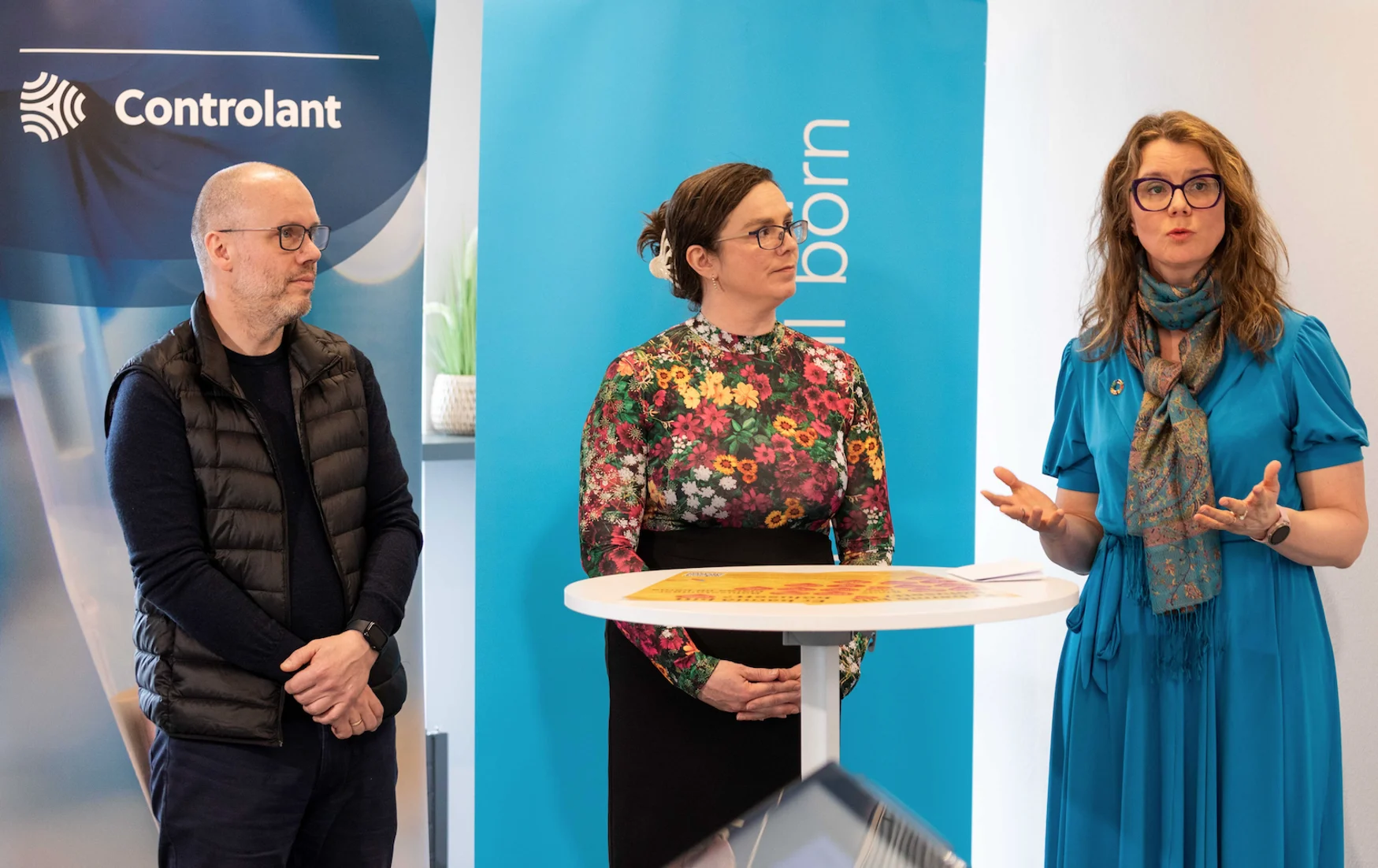Vaccinations have saved six lives per minute since 1950
Controlant is taking part in a joint initiative with its partner UNICEF in Iceland to raise awareness for child vaccinations.

Gísli Herjólfsson, CEO and co-founder at Controlant, Kamilla Jósefsdóttir, Kamilla Sigríður Jósefsdóttir, Medical Officer for Vaccines and Vaccine Preventable Disease at the Directorate of Health, & Birna Thórarinsdóttir, Director of UNICEF Iceland.
As the annual World Immunization Week led by the World Health Organization (WHO) kicks off on 24 April, UNICEF in Iceland and Controlant, together with the Chief Epidemiologist of Iceland, are launching an awareness campaign on childhood vaccinations in Iceland and their effectiveness in preventing the spread of life-threatening diseases and promoting healthy childhoods.
Immunizations are one of the most effective ways to prevent infants and children from falling seriously ill or dying from preventable diseases such as measles, polio, tetanus, diphtheria, and pertussis. Vaccines do not only protect those who get vaccinated, but also promote herd immunity and thereby prevent the spread of diseases to those who are not vaccinated, for example those who are vulnerable due to a weakened immune system or lack of access to vaccines.
Saving the lives of 154 million people
New data from UNICEF and the World Health Organization shows that vaccinations have saved 6 lives every minute for the last 50 years, or over 154 million people combined. Routine immunization of children in Iceland has had similarly successful health outcomes. According to data from the Chief Epidemiologist of Iceland, the lives of an estimated 2,500 infants and children in Iceland have been saved due to vaccinations since 1950.
Vaccines are one of the most cost-effective ways to prevent illness and promote health. Today, vaccines can protect children and adults from up to 20 serious and life-threatening diseases. While this is a success worth celebrating, it must not be taken for granted, as the effectiveness depends on continued participation in routine immunization.
Insufficient participation to prevent the spread of measles
The latest data from the Chief Epidemiologist on participation in routine immunization for children in Iceland shows that participation has decreased by an alarming 4% in the four-year period from 2018 to 2022.
Participation in vaccination against pertussis, diphtheria, and tetanus has been steadily decreasing and dropped from 93% in 2018 to 87% in 2022. Participation in vaccination against measles, mumps, and rubella (MMR) has also declined during this period. In 2018, 94% of children received the first dose of two of the MMR vaccine, whereas by 2022, 91% of children received their first MMR dose. Participation in the second dose of the MMR vaccine was 95% in 2018 and dropped to 89% by 2022.
To achieve herd immunity against measles, at least 90% must get vaccinated. Therefore, the participation rate in vaccinations against measles is insufficient to prevent the spread of measles among children should there be a measles outbreak in Iceland.
The pandemic behind the recent decline in vaccinations
The impact of the COVID-19 pandemic led to the largest decline in childhood vaccinations worldwide in three decades. Iceland is not exempt from this trend—the pandemic affected both access and the capacity to provide routine immunizations to children. Since the start of the pandemic, twice as many children in Iceland have missed their routine immunizations administered at four years of age annually compared to the average year before the pandemic. Almost 1,000 children who should have been vaccinated against measles in 2020 missed their vaccination and most of them have yet to be vaccinated.
Kamilla Sigríður Jósefsdóttir, Medical Officer for Vaccines and Vaccine Preventable Disease at the Directorate of Health
Owing to good participation in routine immunization across several generations, we have mostly been free of diseases such as measles, mumps, and pertussis for decades in Iceland. Recently, we have observed outbreaks of these diseases in various European countries, and some have experienced repeated major measles outbreaks in the past 5-6 years. To date this year, there have been occurrences of all the aforementioned diseases in Iceland, but due to vaccinations, neither measles nor mumps have spread widely. To ensure that we can continue to control the outbreak of these diseases even though they spread to Iceland, we are launching a new website to ensure easy access to reliable information about routine immunization for children in Iceland, such as where they take place, and other practical details. The information is available in several languages, including Romanian, Ukrainian, and Arabic.
How UNICEF helps vaccinations save lives
UNICEF, the United Nations Children's Fund, works to ensure that children across the world – no matter who they are or where they live – have access to the vaccines they need to survive and thrive. Together with partners, UNICEF reaches almost half the world’s children with life-saving vaccines each year and provides over 40% of children in lower-income countries with vaccines.
In over 100 countries, UNICEF works with governments, businesses, non-governmental organizations, and other United Nations (UN) agencies to engage communities, procure and distribute vaccines, keep supplies safe and effective, and facilitate access to vaccines.
UNICEF Iceland disseminates information on vaccination
Iceland is no exception. Every year, UNICEF runs a global awareness campaign on the importance of child immunization and, recently, it has placed special emphasis on the global effort required to turn around the trend of declining child vaccination rates around the world following the COVID-19 pandemic. Joint action is the only way forward to realizing the United Nations Sustainable Development Goal to ensure healthy lives and promote well-being for all ages.
Birna Thórarinsdóttir, Director of UNICEF Iceland:
“Every child has the right to life-saving vaccinations. This also applies to children who live or stay in Iceland, regardless of nationality, citizenship, or economic status. Diseases know no borders and vaccinations can prevent children from becoming seriously ill and protect children who cannot receive vaccinations, due for example to their young age or underlying illnesses. With this campaign, we want to highlight one of humanity’s greatest achievements and celebrate the millions of lives that vaccinations have saved. We hope to reach as many parents and guardians in Iceland as possible with information about the importance of vaccinations and where they can take their children to get vaccinated.”

Is your child vaccinated? An awareness poster is being distributed to all kindergartens in Iceland and can be downloaded here. A new website from the Directorate of Health in Iceland provides information on general vaccinations for children in several languages. The campaign is being run with the support of and in consultation with the Icelandic Directorate of Labor.
Reliable supply chains are a prerequisite for vaccinations
Controlant and UNICEF in Iceland have been in partnership since 2023 with a focus on child immunization. As a global leader in digital transformation and real-time visibility for pharmaceutical supply chains, Controlant enables the safe, traceable, and sustainable delivery of medicine, including vaccines, to patients and people around the world. An unbroken, efficient, and reliable supply chain is essential to meeting the industry’s strict quality requirements and regulations, and to fulfilling every child’s right to vaccinations. This right is enshrined in the 24th article of the UN Convention on the Rights of the Child which stipulates that every child has the right to the highest attainable standard of healthcare, with an emphasis on primary healthcare, the development of preventive healthcare.
Gísli Herjólfsson, CEO and co-founder at Controlant:
"An unbroken supply chain, where the right conditions including temperature and quality are ensured at every step, is integral to safeguarding the opportunity of every child to receive life-saving vaccines. In our partnership with UNICEF, we have focused our efforts on child vaccinations. We are proud to take part in a new awareness-raising initiative with UNICEF and the Chief Epidemiologist in Iceland with the aim of promoting every child’s right to vaccines and thereby supporting healthy and happy childhoods."

